




 |
   |
 |
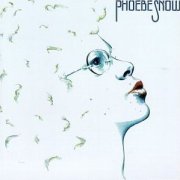 |
Phoebe Snow (1974, 36.37) ***½/T½Good TimesHarpo's Blues Poetry Man Either or Both San Francisco Bay Blues I Don't Want the Night to End Take Your Children Home It Must Be Sunday No Show Tonight |
Current availability:
Mellotron used:
Phoebe Snow (born Phoebe Ann Laub) changed her name to that of the Delaware, Lackawanna and Western Railroad's early 20th Century fictional advertising socialite, presumably due to its a) familiarity and b) catchiness. After doing the usual NYC round of Greenwich Village folk clubs, albeit some years after their heyday, she nailed a contract with Shelter Records, releasing her eponymous debut in 1974. It's a fairly typical mid-'70s singer-songwriter album to be honest, vaguely comparable to Judee Sill or Laura Nyro, although as a non-expert in the genre, I'm prepared to be corrected on that one. It spawned one huge hit, Poetry Man, which reached No. 5 in the U.S. charts in 1975, although, sadly, it didn't lead to fame and fortune, partly due to Snow's genuinely heroic insistence on caring for her severely brain-damaged daughter herself, which impacted heavily on her career.
Despite track-by-track credits on the rear sleeve, there's no mention of a Mellotron anywhere, although it can be heard quite clearly on a few tracks, presumably played by album keyboardist Bob James. Poetry Man, I Don't Want The Night To End and It Must Be Sunday all feature pseudo-orchestral string parts, doubtless due more to budgetary restraints than any desire to actually have a Mellotron on the record, but let's not look a gift horse, OK? Phoebe Snow, while not especially to my taste, is clearly a very good album of its type and should probably be heard in preference to just about anything by Carly Simon et al. Its mix of jazz, blues and folk won't appeal to everybody, but singer-songwriter fans previously unaware of her talents should grab this forthwith. Not much Mellotron and not really used in any meaningful way, but that's hardly the point really, is it? Incidentally, the CD version has a slew of bonus tracks, mostly demos, so it's unlikely there's any more Mellotron content.
A quick postscript to Snow's career (not, of course, that it's anywhere near over) is that her daughter, Valerie Rose, died in March 2007, aged thirty-one. I'm not sure how many of us would've been able to do what Phoebe Snow has done, while keeping some sort of musical career going.
 |
Pink Pearl (2000, 41.35) ***/½ |
|
| Rainy Day Parade One of These Days Lucy at the Gym Claire Mexican Wrestler Heroes Mary Kay Somewhere in New Mexico |
Guy Who Doesn't Get it Someone's Gonna Break Your Heart Loveless Motel Rock Me to Sleep |
|
Current availability:
Mellotron used:
Jill Sobule (1959-2025) attained minor notoriety after writing and performing I Kissed A Girl (title later memorably stolen by Kate Perry for her own song), one of two songs used in 1995's 'sleeper' hit Clueless, taken from her eponymous album (her second) released that year. 2000's Pink Pearl (the name of an American brand of rubber/eraser, obviously also a clitoral reference), her fourth release, contains a reasonably engaging set of songs, highlights including Lucy At The Gym, Mexican Wrestler, Heroes and Guy Who Doesn't Get It, possibly more for their lyrics than the music, which, despite some of Sobule's work being used in the 'usual suspect' TV shows, is much better than you might expect.
Brad Jones plays Mellotron, with chordal flutes on opener Rainy Day Parade, although other 'possible' parts are more likely to be 'improbable'. Is it real? Very possibly not, but the flutes are the hardest samples to spot, so this stays here, at least for the moment. Most of you won't like this very much, but I've heard a great deal worse within the genre.
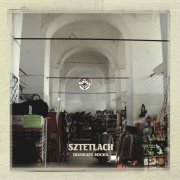 |
Sztetlach (2005, 42.47) ****/T½OshpitsinKartshev Shebreshin Falenitz Zaloshitz Ushvotsk Dembitz Rymanov Kuzmir |
Current availability:
Mellotron used:
Ireneusz Socha is a Polish avant-garde scene mover and shaker, responsible for any number of musical groupings and writings. 2005's Sztetlach (shtetls) is based on Holocaust survivor Szymon Laks' score for Elegy for the Little Jewish Towns and Jarosław Lipszyc's poem Little Towns 2.1, the end result veering between the relatively (non-religiously) orthodox (Kartshev, Paweł Szamburski's solo piece for clarinet, Ushvotsk, for Bolesław Błaszczyk's piano and Rymanov, Raphael Rogiński's solo electric guitar) and the determinedly out-there (choral piece Shebreshin, Zaloshitz's field recordings and Dembitz's percussion and vocal), making for a difficult, yet rewarding album of great emotional depth.
Artur Radomiak plays very obviously real Mellotron on opener Oshpitsin, with exceptionally upfront string and clicky choir use throughout the piece, augmented by real strings and voices, explaining the 'higher than a Mellotron goes' violins at a couple of points. This is a rare example of my giving more than a single T for just one track, albeit a near-seven minute one in this case, although I'd struggle to recommend this album to everyone, on sheer difficulty grounds. File under 'uneasy listening'.
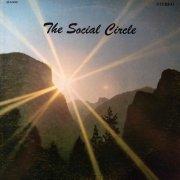 |
The Social Circle (197?, 42.08) *½/TT½ |
||
| Your the Only One Cabaret Medley Welcome Married Money Maybe Cabaret Shaft |
Jesus Christ Superstar Medley Hossanna Herrods Song I Don't Know Superstar Remember Medley Introduction Take the 'A' Train Cheeri Berri Bin Don't Sit Under the Apple Tree |
String of Pearls The Sugar Blues Thanks for the Memories Commercials Oklahoma Me and My Shadow "'Toot" "Toot" Tootsie Rock-a-By Your Baby You Made Me Love You Trolly Song Somewhere Over the Rainbow | |
Current availability:
Mellotron used:
Social Circle were a cabaret/functions act, probably based in the Tennessee region, going by the recording location for their only known album, an undated (probably around 1974) eponymous effort. How bad is this? How bad do you think? Then again, no-one involved could've imagined that a sarcastic Brit might rip their work apart fifty years later, could they? The joint male/female-vocalled quartet's repertoire combined recent hits (Isaac Hayes' Shaft, a Jesus Christ Superstar medley) with unashamed nostalgia, playing to audiences born in the 1930s or earlier. Frankly, they should probably have stuck to the nostalgia; Shaft couldn't sound whiter if it tried, while Lloyd Webber's work manages to sound even more anodyne in their (in)capable hands. The album's true horror, though, is the fourteen-minute Remember Medley, where they tackle tunes from the '40s on, including a brief commercials medley (!), Sinatra, musicals and 'popular song' of the pre-rock'n'roll era. To give them their due, unlike similarly no-budget Christian groups of the time, this lot can actually sing, paying audiences being less forgiving than church congregations.
Mellotron? The unknown player sticks strings all over opener Your The Only One [sic.], flutes on Married, strings under the real clarinet on Maybe and Cabaret, strings on Shaft, Jesus Christ Superstar's I Don't Know and Me And My Shadow and cellos and strings on Somewhere Over The Rainbow, all in suitably gloopy style. Bits of this have turned up on YouTube, but I'm pleased to report that the bulk of it languishes in well-deserved obscurity. Long may it last.
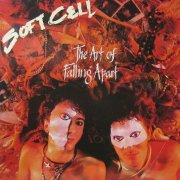 |
The Art of Falling Apart (1983, 40.46/61.43/76.50) ***½/T |
|
| Forever the Same Where the Heart is Numbers Heat Kitchen Sink Drama Baby Doll Loving You, Hating Me The Art of Falling Apart |
[Early pressings and expanded CD issues variously add: Martin Hendrix Medley Hey Joe Purple Haze Voodoo Chile Barriers It's a Mug's Game] |
|
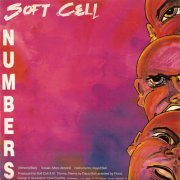 |
7" (1983) ***/½ Numbers Barriers |
Current availability:
Mellotron used:
After the success of Soft Cell's debut, 1981's splendidly sleazy Non-Stop Erotic Cabaret (****) and its attendant singles, following up adequately was always going to be an issue. Early '83's The Art of Falling Apart (initially including a twenty-minute, two-song 12" EP) has a decent stab at it, although possibly only half the album, notably Where The Heart Is (first cousin to Say Hello, Wave Goodbye), Heat, Baby Doll, the title track and the superb EP-only Martin, really cut the mustard. Various critics have pointed out that Marc Almond's rather monotonal voice becomes, er, monotonous after a few songs, while Dave Ball's synths (plenty of Prophet 5 here, fact fans) lack variety, while their ten-minute take on three Hendrix songs on the EP fails badly, but the best material here is at least equal to their debut's lesser numbers.
To my surprise on first hearing this, it became obvious that Dave Ball (1959-2025) had added Mellotron male voices to opener Forever The Same, Baby Doll, Martin and the Hey Joe section of the Hendrix Medley from the EP and b-side Barriers; nothing you haven't heard better elsewhere, but nice to hear at all within the genre, given the year of release. I feel I'm being a little harsh here; The Art of Falling Apart is a good synthpop album, but falls short of greatness.
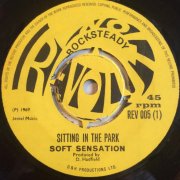 |
7" (1969) ***/T Sitting in the Park Red Window |
Current availability:
Mellotron used:
Soft Sensation were a one-off reggae act, probably from London, most likely consisting of members of multiple other outfits, as was the way in the scene at the time. Sitting in the Park c/w Red Window is a perfectly acceptable example of late '60s Brit-reggae, two inoffensive tracks that probably did well on the dancefloor, if not the charts.
Someone plays the Manfred Mann MkII on the 'A', probably in Chalk Farm Studios, with around twenty seconds of chordal strings in the middle eight, although there's nothing on the instrumental flip. Both sides are available on Circle Records' Unusual Reggae set from 2019.
See: Unusual Reggae
 |
Once Upon a Time (2014, 52.18) ***½/T |
|
| MDCLXVI - The Devil's Year The Devil on Tuesday Once Upon a Time 13 Mercies The Path Less Travelled Mr. Cruel The Devil The Devil's Year |
13 Coils Our Father The Villa War Austin Osman Spare |
|
Current availability:
Mellotron used:
Sol Invictus (named for the Roman sun god) are, essentially, Tony Wakeford's solo project, slotting neatly into the 'neofolk' bracket, although it's probably fair to say that the band as good as invented the genre. 2014's Once Upon a Time is something like his/their fifteenth studio album, combining folk, goth and rock into a mildly avant-garde stew, not to mention its lyrical concerns, typified by the last three tracks' reference to renowned occultist Austin Osman Spare. Highlights? Maybe the haunting 13 Mercies, The Path Less Travelled and 13 Coils, although potential listeners may need to develop a tolerance for Wakeford's vocals, more 'intoned' than 'sung'.
Don Anderson plays suitably wobbly, real-sounding Mellotron strings on The Devil's Year, although all other possible use is probably something else. Difficult to describe, this is, at the very least, an interesting listen, which is more than I can say for, ooh, at least 80% of the albums on this site.
See: Sol Lucet Omnibus | Orchestra Noir
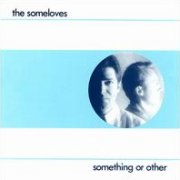 |
Something or Other (1989, 47.40) ****/T |
|
| Melt Back on Side With You Something You Can't Miss Know You Now Girl Soul How She Loves I Didn't Mean That Little Town Crier |
Sunshine's Glove Forever a Dream I'm Falling Down Another Happy Ending |
|
Current availability:
Chamberlin used:
Australians The Someloves are one of powerpop's best-hidden secrets; formed in Perth, WA, in the mid-80s, by ex-Stems and Lime Spiders members, they only released the one album, 1989's Something or Other. It's an absolute gem, although slightly churlish reviewers have pointed out its unoriginal aspects, being heavily influenced by the likes of Badfinger and Big Star. Top tracks include Melt, Know You Now and Forever A Dream, although there isn't a bad song here; of course, if 12-string Rickenbackers, lyrics about girls and, er, more girls and heavenly harmonies don't float your boat, then you're unlikely to go for it, however good I tell you it is.
Produced by Orange Humble Band member, R.E.M. producer and general all-round powerpop good guy Mitch Easter, the album is an early example (along with the second Crowded House album) of the Chamberlin Renaissance that kicked in properly in the early '90s. Played by Easter, it actually isn't all that visible on the record, with some background strings on Girl Soul, only really audible at the end of the song and a string part on How She Loves, although it's possible it's elsewhere, too; the background strings on opener Melt? Hard to say, with an instrument so notoriously shy.
So; a total must for powerpop fans. Less so for those wanting to spot the Chamberlin in its natural environment, although I suppose it could be argued that its natural environment is hidden away under anything else that happens to be in the mix. Anyway; a beautiful album, highly recommended, though not for the Chamby.
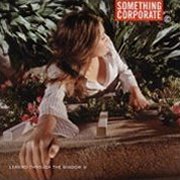 |
Leaving Through the Window (2002, 67.00) **½/½ |
|
| I Want to Save You Punk Rock Princess I Woke Up in a Car If You C Jordan The Astronaut Hurricane Cavanaugh Park Fall |
Straw Dog Good News Drunk Girl Not What it Seems You're Gone Globes & Maps |
|
Current availability:
Chamberlin used:
The ironically-named Something Corporate seem to be classed as pop-punk in some circles, although they apparently prefer the ludicrous description 'piano rock', given that the piano isn't that prominent on their debut album 'proper', 2002's Leaving Through the Window. To be honest, they just sound like any other indie (US division) outfit to me, but what do I know? A few tracks up the energy levels a little, notably Hurricane, but the whole still resembles a (more) lightweight Green Day for most of its vastly overlong duration. So maybe it is 'punk'? Oh and it features a string section on most tracks, just in case you were still harbouring any thoughts that they might challenge The Damned or the Pistols or something. Pah.
Good old Patrick Warren turns up and does his usual thing, i.e. Chamberlin on one track, in this case Globes & Maps. Now, given the album's ubiquitous string section, what's the point in getting someone to play an instrument that sounds almost exactly like strings? I know the Chamby can be alarmingly realistic, if sympathetically arranged and recorded, but I really don't think you'd know you weren't hearing real strings if it didn't say so. Pointless. Actually, that's a good description of the whole album: pointless.
See: Jack's Mannequin
 |
På den Anden Side (2004, 36.00) ***/½ |
|
| Valby Bakke Bomebesikker Københavns Energi Flygtning Endnu en Sommer er Forbi Halvleg Chris & Tania Tigger |
Vand Ved Siden af Hvis Bare Jeg Ku' Pigen & Øen |
|
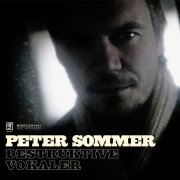 |
Destruktive Vokaler (2006, 41.51) ***/T |
|
| I Morgen er Alt Muligt (Intro) Voksende Mennesker Sang Til Bo Man Hamrer Løs på en Åben Dør Hvorom Alting er Livets Gang i Virkelyst Karma 8-6-6-0 |
De Gamle Stoffer Tænkeboks I Morgen er Alt Muligt |
|
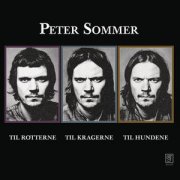 |
Til Rotterne, til Kragerne, til Hundene (2008, 49.14) ***/T½ |
|
| Til Rotterne, til Kragerne, til Hundene Rødt Kort Hærværk Vi Falder Forst den Dag Vi Kigger Ned Hvad Sker Der i Dit Hoved? Himmelflugt 7.777.777 To Bække Små |
Sandhed Nr. 502 Jalousi (Igen!) Chancetur Rodt Kort (ZZ version) |
|
Current availability:
Mellotrons used:
Peter Sommer is a Danish singer-songwriter, who has also played in a couple of critically-rated duos. 2004's På den Anden Side was his first solo album, a mostly acoustic(-ish) effort with the occasional full band track, probably of little interest outside his home market. Henrik Balling plays what sounds like genuine Mellotron flutes on Hvis Bare Jeg Ku', although they rarely rise above the background noise. Two years on, Destruktive Vokaler is definitely more of a band effort, mostly pop/rock, with the occasional more interesting, mildly psychedelic influence creeping in. Balling and Palle Hjorth are both credited this time, with quite real-sounding Mellotron strings on Livets Gang I Virkelyst (listen for the wobbles on the high notes) and Tænkeboks (one each?).
Til Rotterne, til Kragerne, til Hundene keeps up the 'rockier with every release' thing, although the approach doesn't always work. Just Hjorth on Mellotron this time, with little string swells on Rødt Kort (and its remix, the ZZ Version), with more regular parts on To Bække Små and Chancetur. Real? I think so. Sadly, Sommer's next album not only uses samples (probably), but drops the rock for crummy electronica.
See: Samples etc.
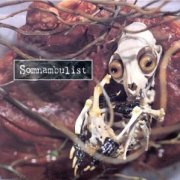 |
Somnambulist (1996, 55.40) ****/TTTTFrotusConqueror Worm Return of the Son of Civilization Globos Formas Para Mañana Pinocchio Multum in Parvo Prometheus' Lament Torquemado Unlearning Folds of Red |
Current availability:
Mellotron used:
Somnambulist are one of the growing number of new bands (many of them American) who have largely (though not entirely) rejected the advances made in keyboard technology since the '70s, while using more modern guitar tones than their predecessors, giving an interesting old/new hybrid sound. They mix'n'match pretty well, with all sorts of influences making themselves apparent (Genesis, Crimson and Van der Graaf spring to mind), while avoiding directly copying anyone's style; in fact, while not really sounding anything like them, Spock's Beard are in at least vaguely the same field. I'd imagine they'd appeal to almost anyone who's into '70s-styled prog, while probably not alienating the neo- crowd either.
There's much Mellotron (from Jody Park) on Somnambulist, with only one track free of tape tyranny, mostly strings, often used quite sparingly and with considerable taste. Saying that, the string intros to both Frotus and Conqueror Worm leap right off the disc at you and there's particularly heavy use on Prometheus' Lament. Actually, this is a superb album; another one where the first listen didn't really sink in, but subsequent plays have made its excellence apparent.
See: Samples etc.
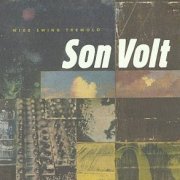 |
Wide Swing Tremolo (1998, 45.30) ***½/T |
|
| Straightface Driving the View Jodel Medicine Hat Strands Flow Dead Man's Clothes Right on Through |
Chanty Carry You Down Question Streets That Time Walks Hanging Blue Side Blind Hope |
|
Current availability:
Chamberlin used:
Son Volt, formed by Jay Farrar, were the 'other' band to rise from the ashes of the lauded Uncle Tupelo, the first, of course, being Wilco. Wide Swing Tremolo is their third album and the last made by their original lineup before Farrar reconvened them in 2004. Probably more 'trad' than Wilco, it's typical alt.country/Americana in many ways, although opener Straightface is almost hard rock, in a Neil Young kind of way and the album's overall feel walks the fine line between rock and country. Yeah, we all know how awful mainstream Nashville country is, but this is a world away from that schlock, getting back to the music's roots and fusing them with psych and post-psych rock, making country acceptable for a generation brought up to hate it.
Farrar plays Chamberlin on one track, Carry You Down, though if you didn't know, you, er, wouldn't know. Ghostly flute lines wander through the sparse piece, but it's hardly groundbreaking use. All in all, this is a defining Americana release, although those with zero tolerance for anything even remotely country may wish to look elsewhere. The album was mixed (but not recorded) at Fidelitorium Studios, so it may or may not be their Chamby M1 we're hearing.
See: Jay Farrar | Wilco
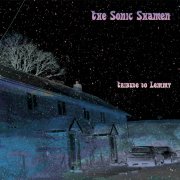 |
Tribute to Lemmy (2017, 149.23) ***½/TT½7 or 7 or NotSam's Gopal Freaky R&R Ravi in Space Stoned Dead Your Clever Jam With Dave #1 |
Current availability:
Mellotron used:
Ian "Lemmy" Kilmister's death, at the close of 2015, has had a seismic effect on the metal and space rock scenes, tributes pouring in from far and wide, not least The Sonic Shamen's Tribute to Lemmy (nicely to the point, chaps). A one-off (?) conglomerate of luminaries from the current British space-rock scene, they include members of Earthling Society, Alan Davey's band and Martin Harvey from my old muckers Litmus, in a dual bass/keys role. In an unusual formatting decision, the first five tracks are found on the double vinyl, while the 75-minute Jam With Dave #1 (that's the legendary Dave Anderson, variously of Amon Düül II, Hawkwind and The Groundhogs, recording venue Foel Studio owner and all-round decent chap) is on CD, so I hope you've got your multi-format hats on.
Musically, this is, as you might expect, the kind of jammed-out instrumental psychedelia that shows America's light-as-air jambands how to do it, shifting between the stoner grooves of opener 7 Or 7 Or Not (homaging Hawkwind's classic 7 By 7), the rhythmless Sam's Gopal (referencing obscure psychedelicists Sam Gopal's Dream, of whom Lemmy was briefly a member, billed as 'Ian Willis'), the raucous biker rock of Freaky R&R and the Eastern drones of Ravi In Space. The CD's lone track (edited down from ninety minutes, apparently), the only piece to actually feature Anderson, is split into four parts, as the mood of the jam slides from one feel to another, my favourite being part two's melodic guitar/Mellotron interplay, the band in full Hall of the Mountain Grill mode.
Martin plays his own Mellotron on two tracks (yes, folks, this means Litmus won't have to borrow mine again!), with drifting strings on Sam's Gopal, the main use being on Dave's Jam, as Anderson freed Martin up to play keys, with a few minutes of strings beginning around the ten-minute mark. He really gets going at the beginning of the second track, though, with a chordal part under a melodic guitar line, while background string and choir parts on the storming track three and strangely-not-that-Mellotronic-sounding choirs on four finish things off nicely. Should this get a higher 'T' rating? Possibly, but given that it only crops up here and there on a monstrously lengthy album, I think my rating's fair. Anyway, a fine example of 'altered consciousness' space rock of the current UK variety.
See: Litmus
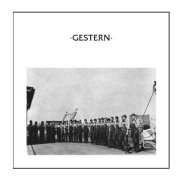 |
Gestern (2008, 45.51/67.49) ***/½ |
|
| Herz aus Geld Was Tun Rotes Telefon Diskolied Lars Vom Mars Ohne Peter Waeren wir Nichts Radio Hollywood |
Der Lustige Konsument Urlaubsgruss Amoureux Solitaires |
|
Current availability:
Mellotron used:
Sonnenbrandt are a modern German synthpop trio, referring to themselves as Frau Sonne (Brandt), Herr (Jojo) Brandt and, er, Kpt. Korg (Stefan Bornhorst). The good Kapitan actually owns several pieces of vintage gear, their website showing him playing live with a Solina string synth and Korg MS10 and MS20s. There doesn't appear to be any Mellotron on 2004's Urlaubgruss Mit Sonnenbrandt EP, but their debut long-player, 2008's Gestern, is an early '80s-referencing album, full of fat, sequenced synths, better tracks including opener Herz Aus Geld, Diskolied and the brilliantly-titled Lars Vom Mars (go on, work it out).
'Korg' plays Mellotron (his own M400, three tape frames), with a choir part on Hollywood, although that would appear to be it. Anyway, a decent enough effort, if not to everyone's taste, but certainly not worth it on the Mellotron front.
See: Silicon Scientist
 |
MP3 EP (2006, 13.26) ***½/TT16th of JuneElefanten Jonathan |
Current availability:
Mellotron used:
I'm not sure how Sonores describe themselves, but to my ears, they sound like a more indie version of early '90s Scandinavian psych/prog heroes Landberk, although I realise it's a possibility they've never even heard of them. Think: very slow, almost rhythmless psychedelia, distant female vocals, lots of reverb. Some might say 'slowcore'; I say 'almost progressive'. After an EP in 2004, the band released a download-only EP called, er, MP3 EP, all tracks from which appeared on their Elefanten album later that year; I haven't heard the album, but see no reason not to review the EP. All three of its tracks conform to the description above, with a quiet, desolate beauty that few British or American bands seem to be able to muster up; must be those long, cold winters.
Jonas O(dhner) plays the band's own new, MkVI Mellotron, with sparse flutes on 16th Of June, equally sparse strings and more flutes on Elefanten and strings on Jonathan, used tastefully and never overdone. I'd imagine the whole album sounds like these three tracks, which might actually be a bit much in one sitting, but in small doses, this stuff is absolutely wonderful.
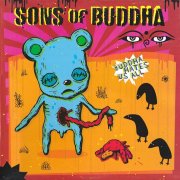 |
Buddha Hates Us All (2008, 29.39) ***/T |
|
| Drunk Punk I Hate Xmas Adieu Watcher is Watching You Heartless Games Psycho Pat The Most Important Are the Smallest Signs Professional Hypocrite |
Playing Suicide So Tired [Hidden track] |
|
Current availability:
Mellotron used:
21st-Century French punk, anyone? Sons of Buddha hail from Serrières, south of Lyon, a suitably small-town background in true Brit-punk mode. Their second album, 2008's Buddha Hates Us All, is a raucous, English-language effort, much of it comparable to the fratboy end of The Dead Kennedys' catalogue, notably opener Drunk Punk and I Hate Xmas. It's probably at its best when they diverge from the tried-and-tested punk rulebook, notably on Heartless Games, The Most Important Are The Smallest Signs and Playing Suicide. And the hidden track? An acoustic muckabout that adds nothing to the proceedings; the running time, above, removes the near-three minutes of silence that precede it.
Studi owner Raphaël Cartellier plays his own M400, if only just, with background chordal strings and upfront cellos on Adieu, adding less to the album than the massive, distorted Hammond he adds to the end of the track.
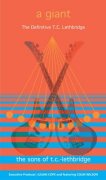 |
A Giant (2003, 116.26) ***½/T |
||
| Road Testing the Proto-type How Did We Get Here? The Minch F.U.S.? (Fixed Universal Scale?) Pertaining to the Stars Sleeping Giant The Block From Cape Wrath to Cape Farewell |
T.C. Who? The Monkey?s Tail Kamikaze Halangy Downer T.C.-L.E.T.H.B.R.I.D.G.E. A Pilot's Eyes (Intro) The Most Amazing Period of His Life... Events at Ladram Bay |
Methodology Interest in the Sky The English Tradition The Robot Ottery St. Mary |
|
Current availability:
Mellotron used:
As disc one, track nine of The Sons of T.C. Lethbridge's A Giant says, "T.C. Who?" Thomas Charles Lethbridge (1901-1971) was an archaeologist who, late in his career and bored of what he referred to as 'academic trade-unionism', began to study the paranormal, writing several books on various related subjects, not least ghost sightings, dowsing, e.s.p. and parapsychology during the last decade of his life. He has subsequently, of course, become a magnet for esotericists of all hues, not least Julian Cope and his cohorts of death.
While Cope is, inevitably, associated with The Sons of T.C. Lethbridge, the band/grouping actually consists of Anthony "Doggen" Foster (Cope, Døgntank), Kevin "Kevlar" Bales (Cope, Brain Donor) and Terry Welbourn "Tekh" (Døgntank), whose one full album project was released in 2003, when they played Cope's Rome Wasn't Burned in a Day event at the Hammersmith Lyric Theatre. Its two discs feature very different approaches: disc (Phase) one is full of the expected Copeian mysticism, psychedelia and all-round general weirdness in the form of wyrd folk (Pertaining To The Stars, From Cape Wrath To Cape Farewell), psychedelic metal (How Did We Get Here?, T.C. Who?) and general madness (F.U.S.? (Fixed Universal Scale?), Halangy Downer), although I'll be fucked if I know what any of this has to do with T.C. Lethbridge. Phase two consists of gentle, yet occasionally disturbing psychedelic explorations overlaid with legendary occultist Colin Wilson expounding knowledgably on Lethbridge's life and work; quite fascinating, if a long way from the generally accepted definition of 'music'.
Frankly, this is pretty minimal on the Mellotron front, Saint Julian adding strings to T.C.-L.E.T.H.B.R.I.D.G.E., with a screechy part running through the track, pitchbending all over the place. Fans of Cope and his mates' music will almost certainly go for this; I actually found disc two far more interesting than disc one, however. Time to read up on Colin Wilson, methinks.
See: Julian Cope | Døgntank | Brain Donor
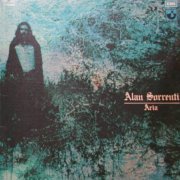 |
Aria (1972, 40.37) **½/½AriaVorrei Incontrarti La Mia Mente Un Fiume Tranquillo |
Current availability:
Mellotron used:
I'm not at all sure how to describe Alan Sorrenti's music, at least on his debut album, Aria (which is a chiefly vocal work, unlike the hapless Glenn Danzig's instrumental Black Aria... Twat...). Mind you, I say 'vocal' only in the sense that there's a good deal of vocalisation on the album; I wouldn't go as far as to call it 'singing' per se. I wouldn't actually go as far as to call it a very pleasant noise, either, although I'm sure it has its aficionados; sadly, I am not among them. 'Screeching and wailing' would seem to be a reasonable description of his style; maybe he was being theatrical. Or something. Anyway, the music isn't too bad, all things considered, being a fairly laid-back kind of proto-prog thing, with the side-long title track being the best effort here, but Sorrenti's tortured tones actually made me switch the damn' thing off halfway through my second listen, which isn't a good sign.
On the bright side, there's a little Mellotron from Albert Prince, with a few string chords on Aria and a brief burst of flutes on La Mia Mente, but we're not talking the most indispensable use ever, to be honest and when you realise you have to listen to that voice to hear a few seconds of average Mellotron use, it's enough to make you, er, go somewhere else. So; bit of a let-down, really. Some of you may be able to handle Sorrenti's dulcet tones, but many of you won't. To be on the safe side, don't bother.
 |
Glamourpuss (1993, 39.53) **½/½Dog Star ManPopcorn Let Your Fingers Do the Walking Sleepwalker Shaheeba Bay Written in the Wind Eileen Alphabet Bangalore Flow Lady of the Lake |
 |
Unspoiled Monsters (1996, 50.00) ***/T |
|
| Untitled Sharks Capital My Stars Anything That Moves Kiss the Streets Sol 66 The Painter Tall Ships |
Mystery Summer Erlkönig |
|
Current availability:
Mellotrons used:
Sort Sol began in 1977 as Sods, the first Danish punk band. After several lineup and stylistic changes, they metamorphosed into their current form, releasing Glamourpuss in 1993. It's one of those 'OK but nothing special' records, combining their punk heritage with a more open-minded approach, typified by lengthy Indian-sounding Bangalore Flow and vaguely prog-influenced closer Lady Of The Lake. Someone calling himself Peter Peter plays Mellotron, with distant choirs and strings on Let Your Fingers Do The Walking and wavery strings on Written In The Wind, though hardly something you couldn't live without.
They followed up with Unspoiled Monsters in 1996, an album not entirely unlike The Cure, which isn't to say that they sound particularly like them, more that they have some of the same influences. Steen Jørgensen's deep, gothlike tones dominate the album, but I detect more of a metal edge than The Cure would ever own up to, though not in a dreadful 'hair' kind of way, thankfully. Wili Jönsson plays Mellotron on the album, with reasonable flute and string parts on Kiss The Streets, although if there's anything else it's well-hidden.
Generally speaking, you're not going to buy these for their Mellotron content and you're probably only going to buy them for the music if you're into a certain strain of post-punk, so I think I'm going to have to say: don't bother.
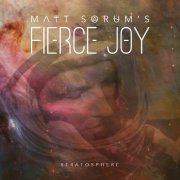 |
Stratosphere (2014, 51.13) ***½/TTT |
|
| Intro: Stratosphere, Pt. 1 The Sea What Ziggy Says For the Wild Ones Goodbye to You Gone Lady of the Stone Ode to Nick Drake |
Blue Josephine Land of the Pure Killers N Lovers The Lonely Teardrop Outro: Stratosphere, Pt. 2 |
|
Current availability:
Mellotron used:
Matt Sorum? Drummer with Guns N'Roses, amongst others, whose album under the Fierce Joy moniker (gifted to him by Lemmy), 2014's Stratosphere, isn't the wasted hard rock effort you might expect, but, effectively, a singer-songwriter record. Stylistically, it runs from The Sea's plangent country to the fittingly Bowiesque What Ziggy Says, the lone slice of real rock'n'roll, For The Wild Ones, the beautiful Josephine (for Sorum's grandmother)... Get the idea? Genuine variety, fine songwriting (sometimes in collaboration with guitarist Lanny Cordola), all carried by Sorum's surprisingly excellent voice.
Mellotron from Bigelf's Damon Fox, with string parts on Intro: Stratosphere, Pt. 1, For The Wild Ones, Land Of The Pure, What Ziggy Says (pitchbent all over the place), flute melodies on Blue and Goodbye To You (I think) and church organ, strings and (Chamberlin?) choirs on Outro: Stratosphere, Pt. 2, although real strings crop up on several tracks, too. What can I say? A very pleasant surprise. Recommended.
See: Bigelf
 |
Alfa y Omega (1975, 33.56) **½/T½OberturaAhora Que Somos Dos Vamos a Hacer el Amor Tú Nos Falta Comunicación Flechas en el Aire Sueño de Cristal Miserere Nobis |
Current availability:
Mellotron used:
Due to the usual language barrier, it's difficult to find out much about Noel Soto unless you speak Spanish, although he seems to be a 'popular singer' in his home country (see: Miguel Rios) who recorded a proggish effort in the mid-'70s, due to the style's popularity at the time. Said effort was 1975's presumably conceptual Alfa y Omega, not so much prog as slightly prog-influenced middling pop/rock, with no real standout characteristics, so no 'lost classic' here.
Luis Fornés plays Mellotron, with a pseudo-orchestral string part on Ahora Que Somos Dos, male voices, strings and flutes on Flechas En El Aire (with its copyright-busting repeating "Lucy in the sky with diamonds" and "I can't get no satisfaction" refrains) and a brief choir part on Sueño De Cristal, although the rest of the album's string parts appear to be string synth. Overall, then, rather disappointing, although I'm not sure why I'd expected any better. Closer Miserere Nobis is about the best thing here, but that isn't saying that much, so with only one reasonable Mellotron track, I think it has to be a 'no'.
 |
¿Quieres Jugar?-¿Wanna Play? (1978, 32.39) **½/T½ |
|
| El Monquirimonchi (Disco-Brinco) Tu Volverás Será Mucho - Será Poco Fuerte Segundo Amor Como Cambia el Tiempo Quisiera Encontrar El Amor de Ayer |
Hay una Muchacha Sandra ... Sandra Monquirimonchi (English - Disco Jump) |
|
Current availability:
Mellotron used:
The sole Cuban entrant on this site, Hannibal "Titti" Sotto (1944-1992) released just five albums, according to Discogs, 1978's ¿Quieres Jugar?-¿Wanna Play? being the fourth. Essentially a Latin pop album of its time, it's probably at its best on El Amor De Ayer, with its splendidly, wildly out of tune guitars and the funky Hay Una Muchacha, but this is an album recorded for the Spanish-speaking market, its lone English-language track, closer Monquirimonchi (Disco Jump), without which the album would be under half an hour, being a translated version of opener El Monquirimonchi (Disco-Brinco).
Hector Garrido is credited with Mellotron, which finally turns up on Hay Una Muchacha, with a chordal string part and flutes running through the track, with cellos and strings on Sandra ... Sandra, although the strings on Como Cambia El Tiempo and Quisiera Encontrar are string synth. I'm sure this is good at what it does, but you've really got to be into Latin pop to appreciate its charms. You already know you probably don't need to hear this, but it's on YouTube if you feel the need.
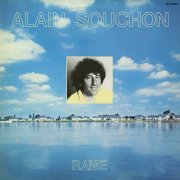 |
Rame (1980, 32.08) ***/T |
|
| On S'Aime Pas Jonasz Marchand de Sirop Petit Tout Me Fait Peur Rame On S'Ennuie Aurore |
Manivelle Courrier |
|
Current availability:
Mellotron used:
Morocco-born Alain "Souchon" Kienast is the kind of artist whose fame in their own country fails to translate elsewhere, both figuratively and literally. 1980's Rame was his fifth album, a perfectly acceptable French-language pop/rock effort, better tracks including Jonasz and the dramatic Aurore, although, as with so many similar efforts, a working knowledge of the language probably helps.
Someone (Pascal Stive?) plays Mellotron, with distant choirs and an upfront flute part on Tout Me Fait Peur, although the cello/woodwindish sound on closer Courrier is probably something else. A cello or one of the woodwinds?
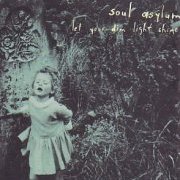 |
Let Your Dim Light Shine (1995, 49.46) **½/½ |
|
| Misery Shut Down To My Own Devices Hopes Up Promises Broken Bittersweetheart String of Pearls Crawl |
Caged Rat Eyes of a Child Just Like Anyone Tell Me When Nothing to Write Home About I Did My Best |
|
Current availability:
Mellotron used:
Minneapolis natives Soul Asylum had already peaked commercially by the time they released Let Your Dim Light Shine in '95, after '92's huge-selling Grave Dancers Union. I believe their earlier sound was more 'punk', in a Hüsker Dü kind of way, but I'm afraid this is no more than a lacklustre 'alt.rock' effort, more like an alternative to rock, to be honest.
Joey Huffman plays organ, piano and Mellotron, with the latter only on closer I Did My Best, with a subtle flute part that enhances the song slightly, though not enough to make it especially worth hearing. Nothing to write home about indeed... Oh and I'd love to know why the rather risible Cult decided to use their name for a song title. Is it a quote from something?
See: Samples etc.